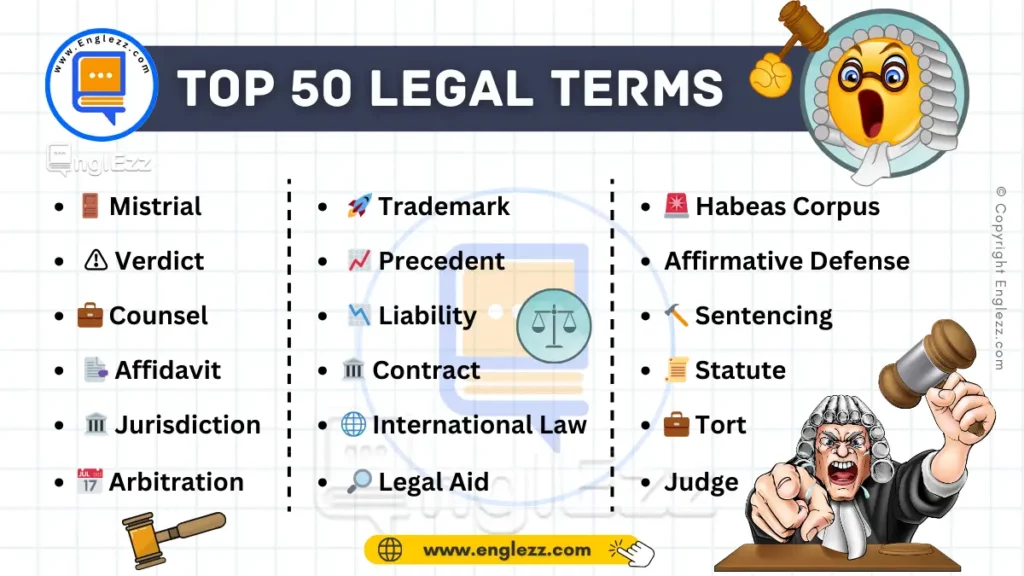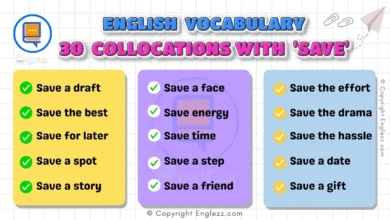Understanding legal terminology is crucial for law students and professionals. Legal English terms often have specific meanings that can differ significantly from their general usage. This blog post will cover 50 Legal English Terms Every Student Must Know, offering definitions, phonetic transcriptions, and practical examples for each term.
Mastery of these terms not only aids in academic success but also enhances communication skills in legal settings. Whether you’re preparing for exams, drafting legal documents, or engaging in legal discussions, a solid grasp of legal vocabulary is essential.
Table of Contents
- 50 Common Legal English Terms With Meanings and Examples
- #1. 🏛️ Defendant /dɪˈfɛndənt/
- #2. ⚖️ Plaintiff /ˈpleɪntɪf/
- #3. 📜 Subpoena /səbˈpiːnə/
- #4. 🕵️ Deposition /ˌdɛpəˈzɪʃən/
- #5. 🚪 Mistrial /ˈmɪstraɪəl/
- #6. ⚠️ Verdict /ˈvɜːrdɪkt/
- #7. 💼 Counsel /ˈkaʊnsəl/
- #8. 📑 Affidavit /ˌæfɪˈdeɪvɪt/
- #9. 🏛️ Jurisdiction /ˌdʒʊrɪsˈdɪkʃən/
- #10. 📅 Arbitration /ˌɑːrbɪˈtreɪʃən/
- #11. 🔒 Injunction /ɪnˈdʒʌŋkʃən/
- #12. 🔄 Appeal /əˈpiːl/
- #13. 🔍 Discovery /dɪsˈkʌvəri/
- #14. 📝 Motion /ˈmoʊʃən/
- #15. 🧑⚖️ Judge /dʒʌdʒ/
- #16. 📈 Precedent /ˈpriːsɪdənt/
- #17. 📉 Liability /laɪəˈbɪləti/
- #18. 🗂️ Contract /ˈkɒntrækt/
- #19. 🌐 International Law /ˌɪntəˈnæʃənəl lɔː/
- #20. 🔎 Legal Aid /ˈliːɡəl eɪd/
- #21. 📊 Due Process /duː ˈprəʊsəs/
- #22. 📅 Pleadings /ˈpliːdɪŋz/
- #23. ⚠️ Burden of Proof /ˈbɜːrdən əv pruːf/
- #24. 💡 Pretrial /ˈpriːtraɪəl/
- #25. 🚨 Habeas Corpus /ˈheɪbiəs ˈkɔːrpəs/
- #26. 📜 Statute /ˈstæʧuːt/
- #27. 🔨 Sentencing /ˈsɛntənsɪŋ/
- #28. 🌟 Affirmative Defense /əˈfɜːrmətɪv dɪˈfɛns/
- #29. 💼 Tort /tɔːrt/
- #30. 🚪 Appeal /əˈpiːl/
- #31. 🏢 Prosecutor /ˈprɒsɪkjuːtə/
- #32. 🕵️ Investigation /ˌɪnvəˈsteɪɡeɪʃən/
- #33. 🔎 Discovery /dɪsˈkʌvəri/
- #34. 📚 Legal Brief /ˈliːɡəl briːf/
- #35. 🧾 Writ /rɪt/
- #36. 🏛️ Jurisdiction /ˌdʒʊrɪsˈdɪkʃən/
- #37. 🗳️ Election Law /ɪˈlɛkʃən lɔː/
- #38. 🏆 Damages /ˈdæmɪdʒɪz/
- #39. 🏘️ Real Estate Law /riːəl ɪˈsteɪt lɔː/
- #40. 🏗️ Zoning Law /ˈzoʊnɪŋ lɔː/
- #41. 🧑⚖️ Docket /ˈdɒkɪt/
- #42. 📜 Contractual Agreement /kənˈtræktʃuəl əˈɡriːmənt/
- #43. 🔑 Collateral /kəˈlætrəl/
- #44. 🧾 Intellectual Property /ˌɪntəˈlɛktʃuəl ˈprɒpəti/
- #45. 🌐 Immigration Law /ˌɪmɪˈɡreɪʃən lɔː/
- #46. 🚀 Trademark /ˈtreɪdmɑːrk/
- #47. 📉 Liquidation /ˌlɪkwɪˈdeɪʃən/
- #48. 🧑💼 Fiduciary Duty /fɪˈdjuːʃəri ˈdjuːti/
- #49. 🏅 Punitive Damages /ˈpjuːnɪtɪv ˈdæmɪdʒɪz/
- #50. 🔎 Discovery /dɪsˈkʌvəri/
- Legal English Terms Table
- Conclusion
50 Common Legal English Terms With Meanings and Examples
By familiarizing yourself with these terms, you’ll be better equipped to navigate the complexities of legal language and enhance your overall legal proficiency. Dive into this comprehensive guide and start mastering the language of the law today!
#1. 🏛️ Defendant /dɪˈfɛndənt/
Definition: The person accused of committing a crime or being sued in a court of law.
Examples:
- The defendant was represented by a skilled attorney during the trial.
- In the civil case, the defendant had to provide evidence to refute the plaintiff’s claims.
#2. ⚖️ Plaintiff /ˈpleɪntɪf/
Definition: The person who brings a case against another in a court of law.
Examples:
- The plaintiff presented compelling evidence to support their claim for damages.
- As the plaintiff in the lawsuit, she sought compensation for the injuries she sustained.
#3. 📜 Subpoena /səbˈpiːnə/
Definition: A legal document ordering someone to attend court or produce evidence.
Examples:
- The witness received a subpoena to testify at the trial next week.
- The lawyer issued a subpoena to obtain the necessary documents for the case.
#4. 🕵️ Deposition /ˌdɛpəˈzɪʃən/
Definition: A sworn statement taken outside of court, usually during discovery.
Examples:
- The deposition provided critical insights into the witness’s testimony.
- During the deposition, the lawyer questioned the witness about their observations.
#5. 🚪 Mistrial /ˈmɪstraɪəl/
Definition: A trial that is invalid due to an error or problem, requiring it to be conducted again.
Examples:
- The jury’s exposure to prejudicial information led to a mistrial.
- The judge declared a mistrial after discovering procedural errors in the case.
#6. ⚠️ Verdict /ˈvɜːrdɪkt/
Definition: The decision made by a jury or judge in a trial.
Examples:
- The jury reached a unanimous verdict of guilty.
- After several hours of deliberation, the judge announced the verdict.
#7. 💼 Counsel /ˈkaʊnsəl/
Definition: A lawyer or group of lawyers providing legal advice or representation.
Examples:
- The defendant’s counsel argued vigorously in court.
- The plaintiff’s counsel filed a motion for summary judgment.
#8. 📑 Affidavit /ˌæfɪˈdeɪvɪt/
Definition: A written statement confirmed by oath or affirmation for use as evidence in court.
Examples:
- The affidavit detailed the witness’s observations of the incident.
- The court required an affidavit to support the motion for a restraining order.
#9. 🏛️ Jurisdiction /ˌdʒʊrɪsˈdɪkʃən/
Definition: The official power to make legal decisions and judgments.
Examples:
- The case was dismissed due to lack of jurisdiction in that state.
- The court’s jurisdiction was challenged by the opposing counsel.
#10. 📅 Arbitration /ˌɑːrbɪˈtreɪʃən/
Definition: A method of resolving disputes outside the courts, where an arbitrator makes a binding decision.
Examples:
- The contract included a clause requiring arbitration for disputes.
- The arbitration panel ruled in favor of the plaintiff.
#11. 🔒 Injunction /ɪnˈdʒʌŋkʃən/
Definition: A court order requiring a party to do or refrain from doing a specific action.
Examples:
- The judge issued an injunction to prevent the company from using the patented technology.
- The plaintiff sought an injunction to stop the construction project.
#12. 🔄 Appeal /əˈpiːl/
Definition: A request for a higher court to review and change the decision of a lower court.
Examples:
- The defendant filed an appeal challenging the conviction.
- The appellate court overturned the lower court’s ruling.
#13. 🔍 Discovery /dɪsˈkʌvəri/
Definition: The pre-trial process where each party investigates the other’s legal claims and defenses.
Examples:
- During discovery, the lawyer obtained crucial documents from the opposing party.
- The discovery phase revealed new evidence that was pivotal to the case.
#14. 📝 Motion /ˈmoʊʃən/
Definition: A formal request made to the court for a specific ruling or order.
Examples:
- The attorney filed a motion to dismiss the case based on lack of evidence.
- The judge granted the motion for a continuance.
#15. 🧑⚖️ Judge /dʒʌdʒ/
Definition: An official who presides over court proceedings and makes decisions on legal matters.
Examples:
- The judge ruled in favor of the plaintiff after reviewing all evidence.
- The judge admonished the witness for not providing truthful testimony.
#16. 📈 Precedent /ˈpriːsɪdənt/
Definition: A legal decision or form of proceeding that serves as an example for future cases.
Examples:
- The court’s decision was influenced by a precedent set in a similar case.
- Legal counsel cited several precedents to support their argument.
#17. 📉 Liability /laɪəˈbɪləti/
Definition: Legal responsibility for one’s actions or omissions.
Examples:
- The company accepted liability for the environmental damage caused.
- The defendant’s liability for the accident was established through evidence.
#18. 🗂️ Contract /ˈkɒntrækt/
Definition: A legally binding agreement between two or more parties.
Examples:
- The parties signed a contract outlining the terms of their business arrangement.
- Breach of contract led to a lawsuit for damages.
#19. 🌐 International Law /ˌɪntəˈnæʃənəl lɔː/
Definition: The set of rules and agreements governing relations between countries.
Examples:
- International law addresses issues such as human rights and trade agreements.
- The dispute was resolved through international arbitration.
#20. 🔎 Legal Aid /ˈliːɡəl eɪd/
Definition: Assistance provided to individuals unable to afford legal representation.
Examples:
- The defendant qualified for legal aid due to their financial situation.
- Legal aid organizations provide free legal services to underserved communities.
#21. 📊 Due Process /duː ˈprəʊsəs/
Definition: The legal requirement that the state must respect all legal rights owed to a person.
Examples:
- The accused was guaranteed due process throughout the trial.
- Violations of due process can lead to wrongful convictions.
#22. 📅 Pleadings /ˈpliːdɪŋz/
Definition: Formal written statements submitted by parties in a lawsuit outlining their claims and defenses.
Examples:
- The pleadings included the plaintiff’s complaint and the defendant’s answer.
- The judge reviewed the pleadings to understand the issues in the case.
#23. ⚠️ Burden of Proof /ˈbɜːrdən əv pruːf/
Definition: The obligation to prove one’s assertion or claim in a legal case.
Examples:
- The plaintiff bore the burden of proof to establish negligence.
- In criminal cases, the prosecution carries the burden of proof beyond a reasonable doubt.

#24. 💡 Pretrial /ˈpriːtraɪəl/
Definition: The period and activities before a trial begins, including hearings and discovery.
Examples:
- The pretrial conference addressed procedural matters and set trial dates.
- Pretrial motions were filed to exclude certain evidence from being presented.
#25. 🚨 Habeas Corpus /ˈheɪbiəs ˈkɔːrpəs/
Definition: A legal principle requiring that a
person under arrest be brought before a judge.
Examples:
- The defendant filed a habeas corpus petition to challenge the legality of their detention.
- Habeas corpus ensures protection against unlawful imprisonment.
#26. 📜 Statute /ˈstæʧuːt/
Definition: A written law enacted by a legislative body.
Examples:
- The statute mandated a minimum wage for all employees.
- The new statute introduced stricter regulations on environmental protection.
#27. 🔨 Sentencing /ˈsɛntənsɪŋ/
Definition: The process of determining the punishment for a convicted criminal.
Examples:
- The judge handed down a sentence of five years in prison.
- Sentencing took into account the defendant’s criminal history and the severity of the crime.
#28. 🌟 Affirmative Defense /əˈfɜːrmətɪv dɪˈfɛns/
Definition: A defense strategy where the defendant admits to the facts but presents additional evidence to justify the actions.
Examples:
- The defendant used self-defense as an affirmative defense in the assault case.
- The affirmative defense of insanity was argued to explain the defendant’s actions.
#29. 💼 Tort /tɔːrt/
Definition: A wrongful act or infringement leading to legal liability.
Examples:
- The plaintiff filed a tort claim for damages caused by the defendant’s negligence.
- Common torts include defamation, assault, and trespass.
#30. 🚪 Appeal /əˈpiːl/
Definition: A legal process where a higher court reviews the decision of a lower court.
Examples:
- The defendant’s appeal was based on claims of judicial error.
- The appellate court’s ruling overturned the trial court’s decision.
#31. 🏢 Prosecutor /ˈprɒsɪkjuːtə/
Definition: A lawyer who represents the state and seeks to prove the defendant’s guilt in a criminal case.
Examples:
- The prosecutor presented evidence linking the defendant to the crime.
- The prosecutor argued for a harsher sentence based on the severity of the offense.
#32. 🕵️ Investigation /ˌɪnvəˈsteɪɡeɪʃən/
Definition: The process of gathering facts and evidence to uncover the truth about a legal matter.
Examples:
- The police conducted a thorough investigation to solve the crime.
- The defense attorney requested additional investigation into the alleged misconduct.
#33. 🔎 Discovery /dɪsˈkʌvəri/
Definition: The pre-trial phase where parties exchange information and evidence.
Examples:
- The discovery process revealed new documents that were critical to the case.
- Both sides used discovery to gather evidence from witnesses.
#34. 📚 Legal Brief /ˈliːɡəl briːf/
Definition: A written document presenting a party’s arguments and supporting evidence.
Examples:
- The attorney submitted a legal brief outlining the arguments for the appeal.
- Legal briefs help judges understand the key issues and legal precedents involved.
#35. 🧾 Writ /rɪt/
Definition: A formal written order issued by a court.
Examples:
- The court issued a writ of execution to enforce the judgment.
- A writ of certiorari was filed to request a higher court review a lower court’s decision.
#36. 🏛️ Jurisdiction /ˌdʒʊrɪsˈdɪkʃən/
Definition: The authority of a court to hear and decide cases.
Examples:
- The case was dismissed due to the court’s lack of jurisdiction over the matter.
- Jurisdiction is a key issue in determining the appropriate venue for a trial.
#37. 🗳️ Election Law /ɪˈlɛkʃən lɔː/
Definition: Laws governing the conduct of elections and voting processes.
Examples:
- Election law ensures the fairness and transparency of voting procedures.
- The candidate challenged the election results based on alleged violations of election law.
#38. 🏆 Damages /ˈdæmɪdʒɪz/
Definition: Financial compensation awarded to a party for loss or injury.
Examples:
- The court awarded damages to the plaintiff for medical expenses and pain.
- The damages were calculated based on the extent of the harm caused by the defendant.
#39. 🏘️ Real Estate Law /riːəl ɪˈsteɪt lɔː/
Definition: Legal principles governing property ownership and transactions.
Examples:
- Real estate law covers issues such as property disputes and contract breaches.
- The lawyer advised on real estate law matters related to the property purchase.
#40. 🏗️ Zoning Law /ˈzoʊnɪŋ lɔː/
Definition: Regulations that control land use and development.
Examples:
- Zoning laws dictate how properties in certain areas can be used.
- The developer needed a variance from zoning laws to proceed with the construction.
#41. 🧑⚖️ Docket /ˈdɒkɪt/
Definition: A list of cases to be tried or heard by a court.
Examples:
- The case was added to the court docket for the upcoming term.
- The lawyer reviewed the docket to prepare for the day’s hearings.
#42. 📜 Contractual Agreement /kənˈtræktʃuəl əˈɡriːmənt/
Definition: A formal contract outlining mutual obligations between parties.
Examples:
- The parties entered into a contractual agreement for the sale of goods.
- Breaches of the contractual agreement led to a dispute resolution process.
#43. 🔑 Collateral /kəˈlætrəl/
Definition: An asset pledged as security for a loan or obligation.
Examples:
- The borrower provided property as collateral for the loan.
- If the borrower defaults, the lender can claim the collateral.
#44. 🧾 Intellectual Property /ˌɪntəˈlɛktʃuəl ˈprɒpəti/
Definition: Legal rights granted for creations of the mind, such as inventions or trademarks.
Examples:
- Intellectual property law protects patents and trademarks.
- The company filed for intellectual property rights to safeguard their innovation.
#45. 🌐 Immigration Law /ˌɪmɪˈɡreɪʃən lɔː/
Definition: Regulations and rules governing immigration and citizenship.
Examples:
- Immigration law affects visa applications and residency requirements.
- The attorney specialized in immigration law to assist clients with their visas.
#46. 🚀 Trademark /ˈtreɪdmɑːrk/
Definition: A symbol, word, or phrase legally registered to represent a company or product.
Examples:
- The company registered a trademark for its brand logo.
- Trademark disputes can arise over the use of similar logos.
#47. 📉 Liquidation /ˌlɪkwɪˈdeɪʃən/
Definition: The process of closing a business and distributing its assets to creditors.
Examples:
- The company underwent liquidation after failing to meet its financial obligations.
- Liquidation involves selling off assets to pay off debts.
#48. 🧑💼 Fiduciary Duty /fɪˈdjuːʃəri ˈdjuːti/
Definition: An obligation to act in the best interest of another party, typically in a financial context.
Examples:
- A trustee has a fiduciary duty to manage assets responsibly.
- Breach of fiduciary duty can result in legal consequences.
#49. 🏅 Punitive Damages /ˈpjuːnɪtɪv ˈdæmɪdʒɪz/
Definition: Additional damages awarded to punish the defendant for egregious behavior.
Examples:
- The court awarded punitive damages to deter similar conduct in the future.
- Punitive damages were awarded in addition to compensatory damages for the plaintiff.
#50. 🔎 Discovery /dɪsˈkʌvəri/
Definition: The pre-trial process where parties exchange evidence and information.
Examples:
- The discovery phase revealed important evidence that influenced the trial outcome.
- Both parties used discovery to gather information from each other’s witnesses.
Legal English Terms Table
Common legal words used in court:
| #1. 🏛️ Defendant | #11. 🔒 Injunction | #21. 📊 Due Process |
|---|---|---|
| #2. ⚖️ Plaintiff | #12. 🔄 Appeal | #22. 📅 Pleadings |
| #3. 📜 Subpoena | #13. 🔍 Discovery | #23. ⚠️ Burden of Proof |
| #4. 🕵️ Deposition | #14. 📝 Motion | #24. 💡 Pretrial |
| #5. 🚪 Mistrial | #15. 🧑⚖️ Judge | #25. 🚨 Habeas Corpus |
| #6. ⚠️ Verdict | #16. 📈 Precedent | #26. 📜 Statute |
| #7. 💼 Counsel | #17. 📉 Liability | #27. 🔨 Sentencing |
| #8. 📑 Affidavit | #18. 🏛️ Contract | #28. 🌟 Affirmative Defense |
| #9. 🏛️ Jurisdiction | #19. 🌐 International Law | #29. 💼 Tort |
| #10. 📅 Arbitration | #20. 🔎 Legal Aid | #30. 🚀 Trademark |
Conclusion
Mastering legal terminology is a vital part of studying law and working in legal fields. The 50 terms listed in this guide represent a foundational vocabulary that will help you navigate various legal contexts with confidence. From understanding court procedures to engaging in legal discussions, having a robust grasp of these terms enhances your ability to communicate effectively and make informed decisions.
Review these terms regularly and integrate them into your studies and practice to ensure that you’re well-prepared for any legal challenge.
Remember, the language of the law is precise and nuanced, and familiarity with these terms will significantly contribute to your success in the legal profession.
Keep exploring, learning, and applying these concepts to stay ahead in your legal career!








